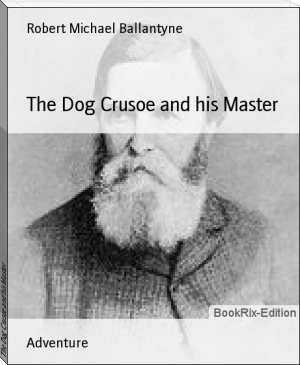Jeff Benson - Robert Michael Ballantyne (best color ebook reader .txt) 📗

- Author: Robert Michael Ballantyne
Book online «Jeff Benson - Robert Michael Ballantyne (best color ebook reader .txt) 📗». Author Robert Michael Ballantyne
"Father, you're all wet! a perfect sponge!"
"True, darling, I forgot! I've just been wrecked, and rescued by the lifeboat through God's great mercy, 'long with all my crew; and there," he added, pointing to Jeff, "stands the man that saved my life."
If Rose loved the young coastguardsman before, she absolutely idolised him now. Something of the feeling must have betrayed itself on her fair face, for Jeff made a step towards her, as if under an irresistible impulse to seize her hand.
But at that moment he experienced an agonising sensation of pain, and, staggering backwards, sat down--almost fell--upon the sofa.
"Nothing--nothing," he replied, to the anxious inquiries of Miss Millet. "Only a little pain, caused by the rap I got from that mast. Come now, auntie, don't fuss about me, but sit down and hear what the captain has got to say."
CHAPTER FIVE.
MISS MILLET RECEIVES A SURPRISE, ROSEBUD A DISAPPOINTMENT, AND OUR HERO ANOTHER BLOW.
Miss Millet was one of those cheery, unselfish, active-minded women who are not easily thrown off their balance--deranged, as the French say--by untoward circumstances.
The arrival of any two friends at two in the morning would have failed to disturb the good nature or weaken the hospitality of that amiable creature. Her joy, therefore, at the sudden, though untimely, appearance of her brother and friend was not marred by selfish considerations; and although she was eager to bear what the captain had to say, she would not let him begin until he and Jeff had retired to an attic chamber and put on dry habiliments.
How male attire came to be so handy in a spinster's house is easily accounted for by the fact that her regard for the memory of her departed father was so great as to have induced her to leave his hat and stick in the passage in their wonted places after his death, and to leave undisturbed the chest of drawers which contained the greater part of his wardrobe. Nothing short of absolute necessity would have induced Miss Millet to disturb these sacred relics; but she knew that death might result from sitting in drenched clothes, and her well-balanced mind at once pointed out that here was a case which demanded a sacrifice. She therefore bowed to the inevitable, and handed her brother the key of the chest of drawers.
As the late Mr Millet had been a large man, the result was that her visitors were admirably fitted out--the only disadvantage being that the captain had to turn up the legs of the trousers and the cuffs of the coat.
Meanwhile Miss Millet lighted a gas-stove, which she had always ready for invalid purposes, and Rose arranged the table, so that when their visitors returned to the parlour, they were greeted with the sight of food and the singing of the tea-kettle.
"I can offer you brandy, brother," said the little hostess, "_as a medicine_!"
"Thankee, Molly--not even as a medicine," said the captain, with a benignant look; "tea is better in the circumstances. I can speak from a vast amount of experience. But of course I speak only for myself. I don't know what Jeff's principles--"
"My principles," interrupted the coastguardsman, "are to leave every man to judge for himself. My judgment for myself is, that, as I don't require strong drink, I'm much better without it."
"My principles go much further than that," said Miss Millet who was an enthusiastic total abstainer. "The Bible justifies me in denying myself the use of wine and all spirituous liquors _for my brother's sake_, so that I may set him an example, and also have more weight when I reason with him, and try to get him to adopt my views."
"Why, Molly, to hear you talk like that about giving up drink for your brother's sake, one would think that I had bin a tippler all my life!"
"You know that I refer to my brother--man, brother."
"Ah, of course--of course; and also your sister-woman, I suppose," cried the captain, seizing the loaf and beginning to cut it into inch-and-a-half slices. "What's _your_ opinion, Rosebud, on the drink question?"
Rose, whose cheeks emulated her namesake flower, replied that, never having tasted wine or spirits in her life, or thought upon the drink question at all, she had no opinion to express.
"Long may you continue in that innocent and humble state of mind, my Rosebud," cried the captain, with a laugh which caused him to choke on his first mouthful of tea. After recovering himself and wiping his eyes, he said--
"Now, Moll, I must tell you all about the wreck;" on which he launched out into a graphic description of what the reader already knows.
You may be sure that he did not underrate the services and heroism of Jeff, who sat wonderfully silent during the recital, and only acknowledged references to himself with a faint smile.
"But, brother," exclaimed Miss Millet, with sudden energy when he had finished, "what will the consequences of this wreck be?"
"The consequences, my dear, will be that the owners will lose a good many thousand pounds, for neither ship nor cargo were insured. An' it sarves 'em right for the vessel was not fit to go to sea; an' they knew it, but were too graspin' to go to the expense o' refittin'. Besides, they've bin what they call so lucky in past years that they thought, I fancy, there was no fear o' their luck departin'."
"But I was not thinking of the owners, brother; I was thinking of the consequences to yourself."
"Why, as to that, Molly, as I've lost my ship, I'm pretty safe to lose my situation; for, from what I know of the owners, they are sure to lay all the blame they can upon my shoulders, so that I won't find it easy to get another ship. Worse than all, I had made a little private adventure of my own, which was very successful, and the result o' which I was bringin' home in gold-dust; and now every nugget o' that is at the bottom o' the sea. So you see, Molly, it's loss an' disaster everywhere--nothin' but a black horizon all round."
Jeff glanced quickly at Miss Millet. This seemed to bear somewhat on their recent discussions. Miss Millet as quickly returned the glance.
"I know what you are thinking, Jeff," she said, with an intelligent look.
"Well, auntie," returned the youth, "it does seem hard to think that any good can come out of all this--doesn't it?"
"Young man," said the captain, regarding Jeff with an almost stern look, "if a savage were taken into a factory and shown the whirling wheels and bands and rollers working in all directions, and saw filthy old rags boiled and mixed up with grass and evil-smelling substances, and torn to shreds and reduced to pulp in the midst of dirt and clattering noise and apparent confusion; and if that savage were to say, `Surely nothin' good can come out of all this!' wouldn't you--knowin' that great rolls of fair and spotless paper were to come out of it--pronounce that savage a fool, or, at least, a presumptuous fellow?"
"True, captain; I accept the rebuke," said Jeff, with a short laugh and a swift glance at Rose, who, however, was gazing demurely at her tea-cup, as if lost in the contemplation of its pattern. Possibly she was thinking of the absurdity of taking tea at all at such an hour!
"Well, then, Jeff," continued the captain, "don't you go and judge unfinished work. Perfect men and women are, in this world, only in process of manufacture. When you see them finished, you'll be better able to judge of the process."
Jeff did not quite agree with his friend; for, gazing at Rose, he could not help feeling that at least one woman had, to his mind, been almost perfectly finished even here! However, he said nothing.
At this point the conversation was turned by Miss Millet suddenly recalling to mind her brother's generous friend in China.
"You have no idea, Dick, how much good I have been able to do with that money. Of course it could not pay for the swimming-bath, or the church, or but here, I have a note of it all."
She pulled a soiled red note-book from her pocket and was about to refer to it, when she was arrested by the grave, sad expression that had overspread her brother's countenance.
"Ah, Molly," he said, "dear Clara Nibsworth was dying when I last saw her, and I fear her father won't survive her long. You remember, I told you the poor girl was delicate and her father old, and the excitement and exertion of that night of the fire was too much for both of them. When I arrived this time in China, I took a run up to their place to see them, and found Clara almost at the point of death. I had little time to spare, and meant to have returned the next day; but the poor broken-down father entreated me so earnestly to remain that I at last agreed to spend three days wi' them. Durin' that time I read the Bible a good deal to the poor girl, and found that she had got her feet firm on the Rock of Ages. She was very grateful, poor thing, and I never saw one so unselfish. She had little thought about herself, although dyin' and in great sufferin'. Her chief anxiety was about her old father, and what he would do when she was gone.
"It was impossible for me to stay to the end, for no one could guess how long the poor thing would hold out. I did my best to comfort the father, and then I left, bringing away a kind message to you, my poor Rosebud. She seems to have loved you dearly, and said you were very kind to her at school."
Rose had covered her face with her hands, and with difficulty restrained her tears.
"But you said the doctors had _some_ hope, father; didn't you?" she asked.
"No, darling, the doctors had none--no more had I. It was her poor father who hoped against hope. Death was written on her sweet face, and it could not be far off. I doubt not she is now with the Lord. When I was leaving, she gave me a small packet for you; but that, with everything else in the _North Star_, has gone to the bottom. But we must be goin' now," continued the captain, rising. "I see Jeff is gettin' wearied--an' no wonder. Besides, it won't do to keep you two up here talkin' till daylight."
Jeff protested that he was not weary--that in such company it was impossible for him to tire! but Rose was too much distressed by her father's narrative to observe the compliment.
Still, in spite of his protest, there was something in our hero's manner and look which belied his words; and when he returned to the coastguard station that day, and was about to lie down for much-needed repose, his friend and mate, David





Comments (0)